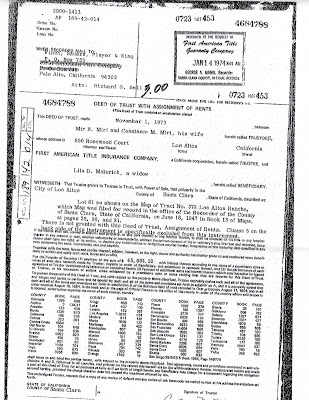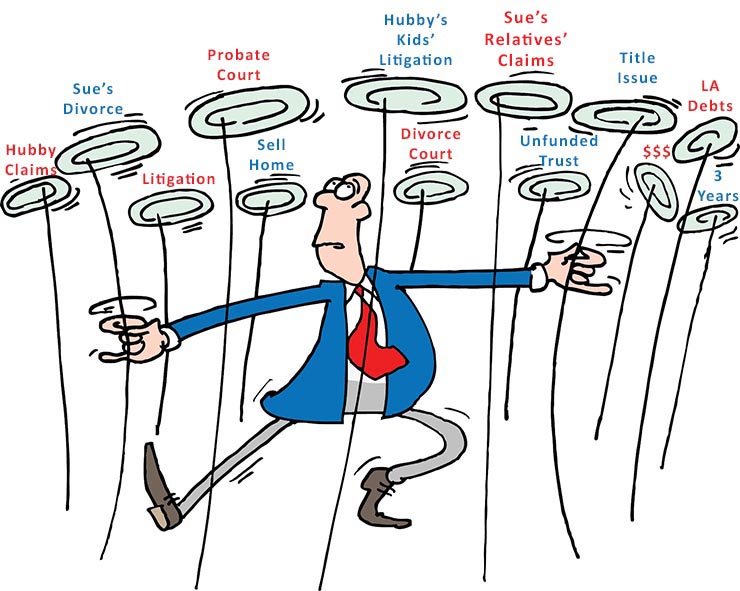Don’t set up a trust before understanding the Tax and Probate Fees issues
Types of trusts
In addition to describing a trust as revocable or irrevocable, there are many types and variations of trusts, depending upon the purpose for the trust. Typical trusts are living revocable trusts to avoid probate and help save estate taxes; irrevocable life insurance trusts; irrevocable trusts to set money aside for college education; special needs trusts; generation skipping “dynasty” trusts; spendthrift trusts; Charitable remainder trusts; and Personal residence trusts; to name a few. Trusts are custom prepared to suit the situation involved.

Taxation issues can be expensive
All tax issues involving trusts that must be understood in determining what type of trust to use. Attorney David Crockett advises on all the tax questions before preparing any trust. Determine all the tax issues in advance of trust setup. The tax questions are:
- Will the money & property in the trust be subject to federal estate taxes on the death of the Trustors or the death of the beneficiaries?
- Who will pay the income taxes on the income generated by the trust (ordinary income, portfolio income, or capital gains)? Will the Trustors pay the tax on their personal income tax returns, or will the trust pay the tax on its fiduciary income tax return, or will the beneficiaries pay the tax?
- Will there be gift taxes on the transfers into the trust?
- Will the property taxes increase if real estate is transferred into the trust or transferred out of the trust?
Probate fee avoidance
Money and property placed into a properly prepared living trust before your death generally will not be subject to probate court proceedings. Probate court proceedings have mandatory attorney fees which for example on a $500,000 estate would be $11,150 and on a $1,000,000 estate would be $18,000. This is one reason for the popularity of living trusts. A living trust enables you to set and organize the scheme of distribution of your property before death and to see how well the trust and Trustee work. Generally you save a lot of probate fees by doing a trust.
 Real estate property ownership is legally changed by a document commonly known as a deed which is signed by the person making the ownership transfer. The deed is then recorded with the County recorder in the county where the property is located.
Real estate property ownership is legally changed by a document commonly known as a deed which is signed by the person making the ownership transfer. The deed is then recorded with the County recorder in the county where the property is located. Orange County Estate Planning Lawyer Blog
Orange County Estate Planning Lawyer Blog





 Trusts for Special Needs – Special Needs Trusts are used to hold money and property for specific periods of time, and to pay out the money and property according to detailed written instructions. Special Needs Trusts in particular are for lifetime financial and personal care for a Beneficiary who has a disability. The concept is to have money and property available for a disabled person but completely controlled by someone else, typically known as a Third Party Trustee. If properly structured and administered, the disabled person/Beneficiary, may still keep receiving public benefits such as Supplement Security Income (SSI) and Medi-Cal. Giving an inheritance to a disabled person by trust or through probate can be disastrous if they lose their public benefits.
Trusts for Special Needs – Special Needs Trusts are used to hold money and property for specific periods of time, and to pay out the money and property according to detailed written instructions. Special Needs Trusts in particular are for lifetime financial and personal care for a Beneficiary who has a disability. The concept is to have money and property available for a disabled person but completely controlled by someone else, typically known as a Third Party Trustee. If properly structured and administered, the disabled person/Beneficiary, may still keep receiving public benefits such as Supplement Security Income (SSI) and Medi-Cal. Giving an inheritance to a disabled person by trust or through probate can be disastrous if they lose their public benefits.
